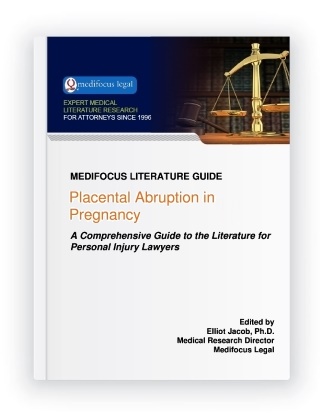Placental Abruption in PregnancyA Comprehensive Guide to the Literature for Personal Injury Lawyers
Publisher: Medifocus Legal
Publication Date: September 2, 2022
Number of Pages: 118
A Comprehensive Guide to the Literature for Personal Injury Lawyers
Publisher: Medifocus LegalPublication Date: September 2, 2022
Number of Pages: 118
1. Maternal Health History - maternal age over 35 years; smoking; cocaine use in pregnancy; and hypertension.
2. Current Pregnancy Complications - short umbilical cord; sudden uterine decompression; multiple gestation pregnancies; preeclampsia; and polyhydramnios.
3. Unexplained Trauma - trauma to the abdomen of a pregnant woman from a motor vehicle accident, an accidental fall, or a violent blow have been associated with placental abruption.
Once placental abruption occurs, it can reduce or completely deprive the fetus of oxygen and vital nutrients and can also cause heavy maternal bleeding. If left untreated, placental abruption can endanger the lives of both mother and her fetus. Maternal complication of placental abruption many include hemorrhage with the need for blood transfusions; disseminated intravascular coagulopathy (DIC); kidney failure; and pituitary gland necrosis. Adverse neonatal consequences of placental abruption include premature birth; perinatal asphyxia; stillbirth; and neonatal death.
The onset of placental abruption is typically sudden and requires immediate evaluation and treatment. After admission to a hospital, most women will receive IV fluids, supplemental oxygen, and continuous maternal and fetal monitoring. Subsequent treatment will vary depending upon the gestational age of the fetus and the severity of the distress being experienced by the woman and/or the fetus. In general, Class 1 (mild) placental abruption with no evidence of either maternal or fetal distress can be managed conservatively if the pregnancy is less than 37 weeks gestation. In cases involving a Class 2(moderate) or Class 3 (severe) placental abruption in which the fetus is deemed to be viable, delivery of the fetus is necessary. The preferred route of delivery is vaginal birth. If, however, there are signs of fetal distress, an emergency cesarean birth is necessary to protect the fetus. Postoperatively, the mother requires careful monitoring for signs of postpartum hemorrhage as well as for any potential clotting complications. A neonatal team needs to be present in the delivery room to receive and manage the infant for any potential complications.
The MediFocus Literature Guide to Placental Abruption in Pregnancy is a comprehensive roadmap to the medical literature for personal injury attorneys who may be involved in litigating cases of a placental abruption. This unique Literature Guide includes nearly 150 hand-selected references of articles published in peer-reviewed journals with links to the abstracts of the articles. The articles included in this Literature Guide represent the current medical knowledge about placental abruption and focus on a broad range of topics including risk factors, causes, diagnosis, treatment, and outcomes. The Guide also includes a valuable Author Directory for quickly identifying and locating medical experts with specialized knowledge about placental abruption.
 |
- A comprehensive bibliography of 148 journal article references indexed in MEDLINE published in well respected medical and scientific journals.
- Online access to the abstracts (summaries) of the articles.
- Online access to the free full-text version of 35 articles.
- Links to full-text sources of other articles that are available for purchase directly from individual journal publishers.
- A unique "Author Directory" consisting of the names and institutional affiliations of experts who have published and have specialized knowledge about Placental Abruption in Pregnancy. The "Author Directory" is a valuable resource for quickly identifying and locating experts for case reviews, opinions, and testimony.
Select examples of topics that are covered by the articles referenced in this Guidebook include:
- Factors associated with poor fetal outcome in placental abruption.
- Risk factors for cerebral palsy in neonates due to placental abruption.
- The impact of the abruption severity and the onset-to-delivery time on the maternal and neonatal outcomes of placental abruption.
- Clinical significance of primary symptoms in women with placental abruption.
- Maternal, Labor, Delivery, and Perinatal Outcomes Associated with Placental Abruption: A Systematic Review.
- Neurodevelopmental outcomes in children in relation to placental abruption.
- Obstetric and neonatal outcome following minor trauma in pregnancy. Is hospitalization warranted?
- Risk factors for perinatal mortality in patients admitted to the hospital with the diagnosis of placental abruption.
- Maternal sleep duration and complaints of vital exhaustion during pregnancy is associated with placental abruption.
- Decision-to-delivery interval in suspected placental abruption - association with pregnancy outcome.
- Increased prevalence of major congenital anomalies in births with placental abruption.
- Fetal heart rate patterns related to neonatal brain damage and neonatal death in placental abruption.
- Placental abruption and premature rupture of membranes.
- CT evaluation of placental abruption in pregnant trauma patients.
- Fetal heart rate pattern reflecting the severity of placental abruption.
- Uterine trauma in pregnancy after motor vehicle crashes with airbag deployment: A 30-case series.
- Previous cesarean delivery and risks of placenta previa and placental abruption.
- Preterm premature rupture of membranes, intrauterine infection, and oligohydramnios: risk factors for placental abruption.
- The injury severity score in pregnant trauma patients: predicting placental abruption and fetal death.
- Abruptio placentae after auto accidents. A case-control study.
is available in two formats: | |
Order by Phone:To order by phone, please call: Order by Mail:To order by mail, please print and complete this Order Form | |

